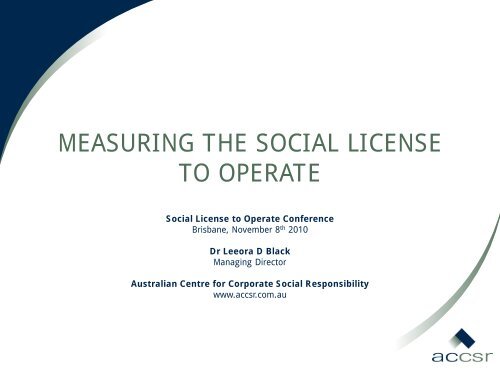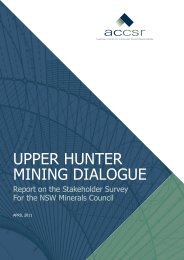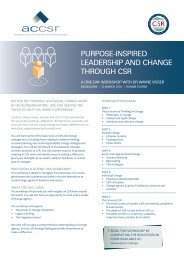MEASURING THE SOCIAL LICENSE TO OPERATE - ACCSR
MEASURING THE SOCIAL LICENSE TO OPERATE - ACCSR
MEASURING THE SOCIAL LICENSE TO OPERATE - ACCSR
You also want an ePaper? Increase the reach of your titles
YUMPU automatically turns print PDFs into web optimized ePapers that Google loves.
<strong>MEASURING</strong> <strong>THE</strong> <strong>SOCIAL</strong> <strong>LICENSE</strong><br />
<strong>TO</strong> <strong>OPERATE</strong><br />
Social License to Operate Conference<br />
Brisbane, November 8 th 2010<br />
Dr Leeora D Black<br />
Managing Director<br />
Australian Centre for Corporate Social Responsibility<br />
www.accsr.com.au
ABOUT <strong>ACCSR</strong><br />
• Established 2003<br />
• Consulting and training company wholly dedicated to<br />
building competitive advantage and stakeholder<br />
wealth through corporate social responsibility<br />
• Partnership with La Trobe University Graduate School<br />
of Management since 2008<br />
• Accredited GRI trainer<br />
• Publishes annual State of CSR in Australia
WHAT THIS PRESENTATION COVERS<br />
• Defining social license to operate<br />
• Method for measuring<br />
• Case study<br />
• Pitfalls to avoid<br />
Acknowledgement:<br />
Dr Robert Boutilier, <strong>ACCSR</strong> Senior International Associate and Center for<br />
Sustainable Community Development, Simon Fraser University, Vancouver,<br />
Canada, and<br />
Dr Ian Thomson, Principal, On Common Ground Consultants Inc, Vancouver,<br />
Canada
DEFINING SLO<br />
• A perception based on the legitimacy of a mine,<br />
company or industry<br />
• Entails acceptance (the basic level) and approval (a higher<br />
level)<br />
• On occasions can<br />
transcend approval to a sense<br />
of ownership or be with-held<br />
• Will vary over the life<br />
of a project and by<br />
stakeholder group.<br />
The Ups and Downs of Social Capital at San Cristobal<br />
Boutilier & Thomson 2008
MODEL OF SLO<br />
Co-ownership - The community has very high<br />
trust in the company and sees itself as sharing<br />
responsibility for the company’s success.<br />
Stakeholders will advocate for the company<br />
when necessary.<br />
Approval - The company has established both<br />
legitimacy and credibility, and the community<br />
approves of the company.<br />
Acceptance - The community listens to the<br />
company and considers its proposals. If, by<br />
their own standards, they have no reason to<br />
doubt the company’s credibility, they may allow<br />
a project to tentatively proceed.<br />
© 2009 Boutilier & Thomson<br />
Withholding/withdrawal - The rejection<br />
level of a social licence is the worst case<br />
scenario. This can manifest in complaints,<br />
blockades and public action against individual<br />
sites, companies or the industry as a whole.
<strong>SOCIAL</strong> <strong>LICENSE</strong> <strong>TO</strong> <strong>OPERATE</strong>- DEFINITION<br />
AND MEASURE<br />
Definition<br />
The concept of the social license to operate derives from notions of sociopolitical<br />
risk in the stakeholder environment.<br />
“honest communication”,<br />
(transparent, honest<br />
and shared of<br />
information)<br />
“respect and norms”<br />
(fairness ethics and<br />
respect of stakeholders’<br />
waits and norms)<br />
“pragmatic”<br />
(advantages for the<br />
stakeholders to collaborate<br />
with the mine).<br />
Measurement<br />
Measure of Perceptions - List of statements rated by respondents from<br />
“strongly disagree” to “strongly agree”
SLO AS A MULTI-DIMENSIONAL CONSTRUCT<br />
Markers of<br />
Boundary<br />
Criteria<br />
Xcorp is a<br />
legitimate<br />
organisation<br />
Xcorp is a<br />
credible<br />
organisation<br />
Xcorp is a<br />
trustworthy<br />
organisation<br />
Pragmatic<br />
motivation to<br />
relate<br />
Recognise<br />
benefits<br />
Agree and cooperate<br />
with one<br />
another<br />
Improves our<br />
situation<br />
Respect for<br />
people and<br />
norms<br />
Respects local<br />
ways, ethical<br />
conduct<br />
Consistent,<br />
accurate &<br />
inclusive<br />
decision-making<br />
Fairness<br />
Honest,<br />
transparent<br />
communication<br />
Openness<br />
Information<br />
quality &<br />
quantity<br />
Believable
PITFALLS <strong>TO</strong> AVOID<br />
• Inadequate investment in relationship-building<br />
• Selective engagement<br />
• Failing to deliver on promises<br />
• Failing to understand internal structure of the community<br />
• Failing to listen and respect with over-reliance on legal<br />
permits<br />
• Failing to maintain close contact when there are changes<br />
of personnel in the company<br />
• Over-estimating the quality of the relationship
RELATIONSHIP STRENG<strong>THE</strong>NING ACTIVITIES<br />
• Respect and inclusiveness<br />
• Transparency and honesty<br />
• Listening and empathy<br />
• Responsiveness and promise-keeping<br />
• Good Will/Care - Protecting the interests of the other<br />
• Clear rules and principled actions<br />
• Developing and working towards shared goals
CONCLUSION<br />
• SLO is a perception<br />
– Varies in time and among groups<br />
• Hard to earn, easy to lose<br />
• Once lost, very hard to recover previous levels<br />
• Highly valuable intangible asset<br />
• Key driver of SLO is relationships<br />
• <strong>ACCSR</strong>’s best advice to you:<br />
– WORK ON STAKEHOLDER RELATIONSHIPS!<br />
Thank you and good luck!




